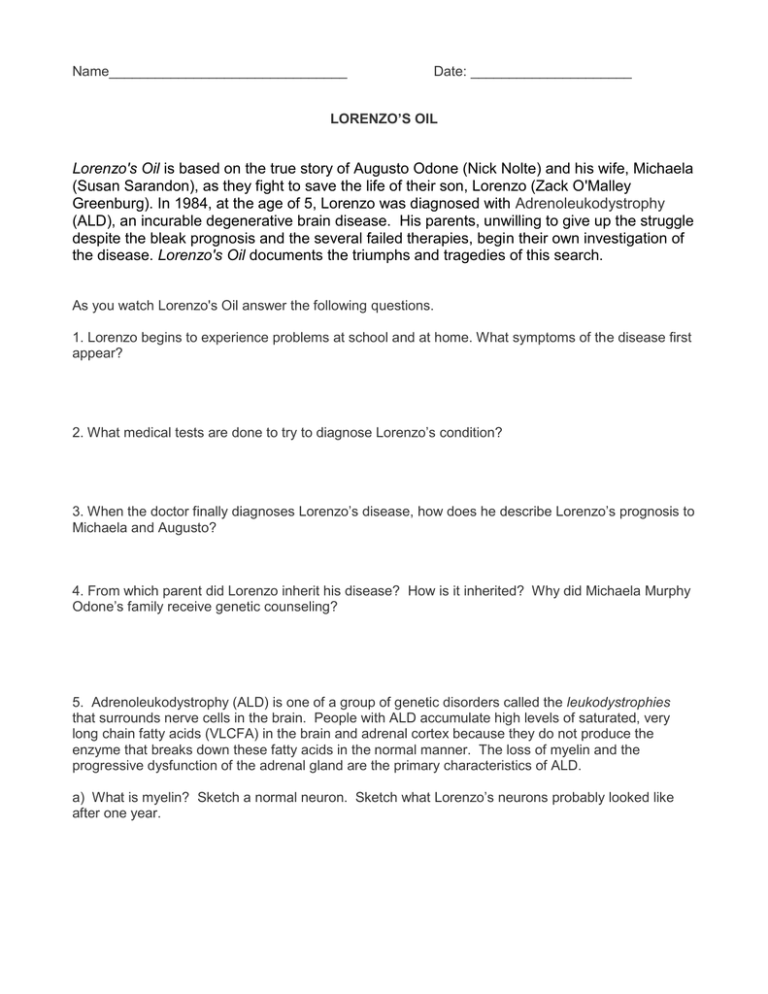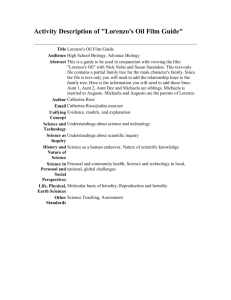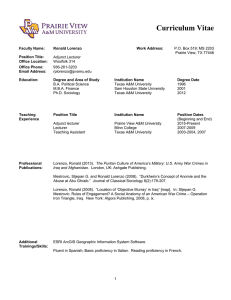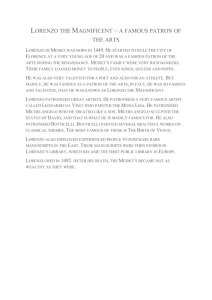Lorenzo's Oil
advertisement

Name_______________________________ Date: _____________________ LORENZO’S OIL Lorenzo's Oil is based on the true story of Augusto Odone (Nick Nolte) and his wife, Michaela (Susan Sarandon), as they fight to save the life of their son, Lorenzo (Zack O'Malley Greenburg). In 1984, at the age of 5, Lorenzo was diagnosed with Adrenoleukodystrophy (ALD), an incurable degenerative brain disease. His parents, unwilling to give up the struggle despite the bleak prognosis and the several failed therapies, begin their own investigation of the disease. Lorenzo's Oil documents the triumphs and tragedies of this search. As you watch Lorenzo's Oil answer the following questions. 1. Lorenzo begins to experience problems at school and at home. What symptoms of the disease first appear? 2. What medical tests are done to try to diagnose Lorenzo’s condition? 3. When the doctor finally diagnoses Lorenzo’s disease, how does he describe Lorenzo’s prognosis to Michaela and Augusto? 4. From which parent did Lorenzo inherit his disease? How is it inherited? Why did Michaela Murphy Odone’s family receive genetic counseling? 5. Adrenoleukodystrophy (ALD) is one of a group of genetic disorders called the leukodystrophies that surrounds nerve cells in the brain. People with ALD accumulate high levels of saturated, very long chain fatty acids (VLCFA) in the brain and adrenal cortex because they do not produce the enzyme that breaks down these fatty acids in the normal manner. The loss of myelin and the progressive dysfunction of the adrenal gland are the primary characteristics of ALD. a) What is myelin? Sketch a normal neuron. Sketch what Lorenzo’s neurons probably looked like after one year. b) The biochemical basis of this disease is related to the metabolism of what molecules? c) Explain how damaged myelin could cause Lorenzo’s symptoms. 6. When the Odones’ enroll Lorenzo in the first study, what kinds of foods is Lorenzo NOT allowed to eat? 7. When Lorenzo does not get good results from the diet in this study, what do Lorenzo’s parents believe might be happening? Describe what Augusto means when he uses the analogy of a sink with two faucets. 8. What does the paperclip model demonstrate to Augusto? What property of enzyme activity is demonstrated through this model? 9. How does taking “Lorenzo’s Oil” stop Lorenzo’s symptoms from getting worse? 10. Once Lorenzo is on “Lorenzo’s Oil” why doesn’t he regain many of the abilities he had before he got the disease? 11. Describe at least three things that Lorenzo’s parents did to try to find a cure for adenoleukodystrophy even though the doctors said there is no cure for it? 12. Why did the medical community resist the Odones’ treatment ideas? Why did the parent support group resist? 13. This movie is based on a true story. The real Lorenzo lived much longer than the doctors predicted. In fact, he died in 2008 the day after his 30th birthday. What do you think about what Michaela and Augusto Odone did for their son and the other boys who suffer from ALD? Ethical Questions in Lorenzo’s Oil Please ponder the following questions as you watch the movie. Be prepared to answer if any show up on your test. 1. Dr. Nicolaitis, the third doctor the Odones go to see, is a specialist doing research on Lorenzo’s disease, ALD. He hopes to slow down the progress of the disease by dietary restrictions. Should a researcher offer any hope of improvement or slowing down the destruction of an irreversible illness, when trying to get a patient to enroll in a study? 2. If an illness is affecting a child’s health, should that child have a say in any decision that has to be made regarding treatment? Should parents be allowed to make these decisions for their children? Should a parent’s decision override a court’s decision to stop or start treatment? Can you think of examples where the court system has stepped in? Is this acceptable? 3. Multiple Sclerosis (MS) is another debilitating disease that affects the nervous system, specifically the myelin of the neurons in the brain and spinal cord. An estimated 55,000 – 75,000 Canadians suffer from this disease experiencing symptoms such as: visual disturbances; speech problems; changes in sensation such as numbness or pain; loss of coordination or balance; bladder and bowel problems; stiffness of muscles, weakening or paralysis of any part of the body; unusual and extreme fatigue, and mood or cognitive changes. A controversial new therapy was designed by an Italian doctor but it has not been approved by Health Canada. Read up on this story at http://www.cbc.ca/news/yourcommunity/2010/11/yourinterview-experimental-ms-treatments-and-ethical-issues.html If you or someone you loved lived with this disease, would you want access to this controversial treatment? Do you agree with Health Canada’s decision to not fund this experimental treatment? 4. Michaela finds the article about Polish rats and fatty acid manipulation. But she’s disturbed that scientists don’t search the literature as carefully as she does: “all these experts working in isolation, each working on his own piece of the jigsaw puzzle.” Does science work this way, and is it ethical? 5. Dr. Nicolaitis says research on very rare (or “orphan”) diseases doesn’t get much funding, especially with government cutbacks. Opposition to taxes and government spending is a common theme in all political conservatism. Could this be unethical? What are the obligations of government to try to financially support research and cure illness? Should governments focus on more common illnesses, such as cancer and heart disease, or do rarer diseases deserve as much attention?



